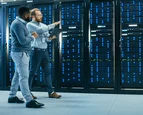Traditional IT suppliers with central systems and systems of record of customers, employees, citizens or invoices will take on a central role in the digital ecosystem. To be consistently relevant, a culture change is needed in those organizations. Van Alstyne and Parker describe it in Harvard Business Review, "Management needs to understand the ecosystem and actively engage in partner management. They need to learn how to motivate people they don't know to share ideas that have not come from within the organization."
Fear of cannibalism
Traditionally, organizations have feared partners who take away revenue that they could realize themselves. Even their own solutions that replace traditional systems and generate less revenue are rejected for fear of cannibalization in the short term. This cultural mindset is disastrous for the long term. Sustainable relevance does not come from turnover, but from the added value that the organization delivers to the market. Long-term financial results are a consequence of relevance.
Van Alstyne en Parker: "To set up a good digital ecosystem, it has to be interesting for partners to link to your solutions. Otherwise, it's like organizing a party where nobody shows up. You make the difference by how you invite, welcome and support partners in connecting to your solutions. The mindset of management needs to change from controlling to supporting and from including to rewarding. One rule is important: create more value for your partner than you take, only then will they keep coming."
Microsoft
Microsoft is an organization that went through this change after Satya Nadella's arrival in 2014. Nadella: "The playing field has changed dramatically, new and surprising partnerships were needed to remain relevant.”



